Huskies are intelligent, active dogs, and the food they need to eat depends on their activity levels, age, and size. Huskies can thrive on a wide variety of wet or dry foods, including meat, fruits, grains, and veggies, but what does that include exactly, and what do huskies eat to keep healthy?
What Is a Husky?
A husky is a polar region dog that’s bred for work in freezing temperatures. They are hardy, clever, and adapted to snow and frost. Huskies are known for their sled work, and the breed is evolving to take advantage of modern fast crossbreeds.
This means a husky is naturally active, and active dogs have a good appetite for food. So, what do huskies eat?
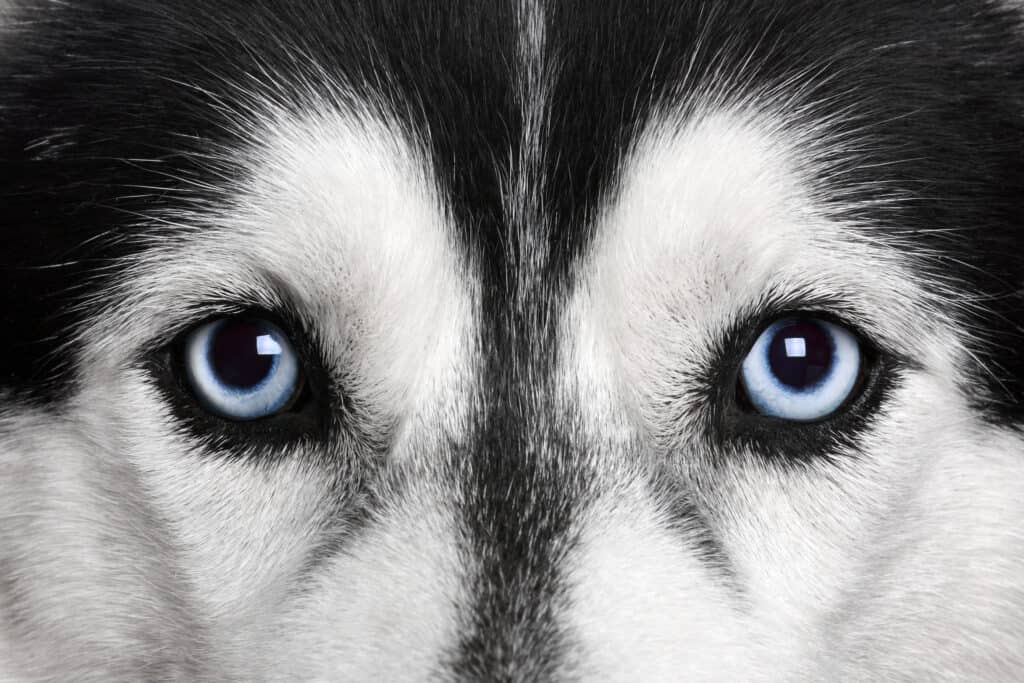
Although Huskies weigh only 60 pounds, they’re strong for their size and are very independent animals.
©244162930/Shutterstock.com
Sled Dog Husky Diet
Sled huskies are tough, fit, and need more calories than a pet husky because they burn through a lot of energy. Working sled huskies use up 10,000 calories daily compared to a pet dog’s 1,700. Mushing (that’s sled dog racing) teams feed their huskies a precise combination of energy-rich food that includes meat protein such as beef or chicken plus kibble mixed with hot water when it’s winter cold.
Because domestic pet huskies don’t burn off so much energy, they don’t need as much calorie intake as a sled dog. Like all domestic pets, it’s easy to overfeed them, even if you mean well.
Pet Huskies Diet
Active adult huskies should eat high-quality food with plenty of protein, carbs, and fats. There are many options, including commercial wet or dry food or home-cooked dog food. Home-cooked husky food must contain enough nutrients for an adult dog, so check with your veterinarian to ensure you’ve got the right balance. Like all dogs, huskies love snacks, but they are best kept to a minimum.
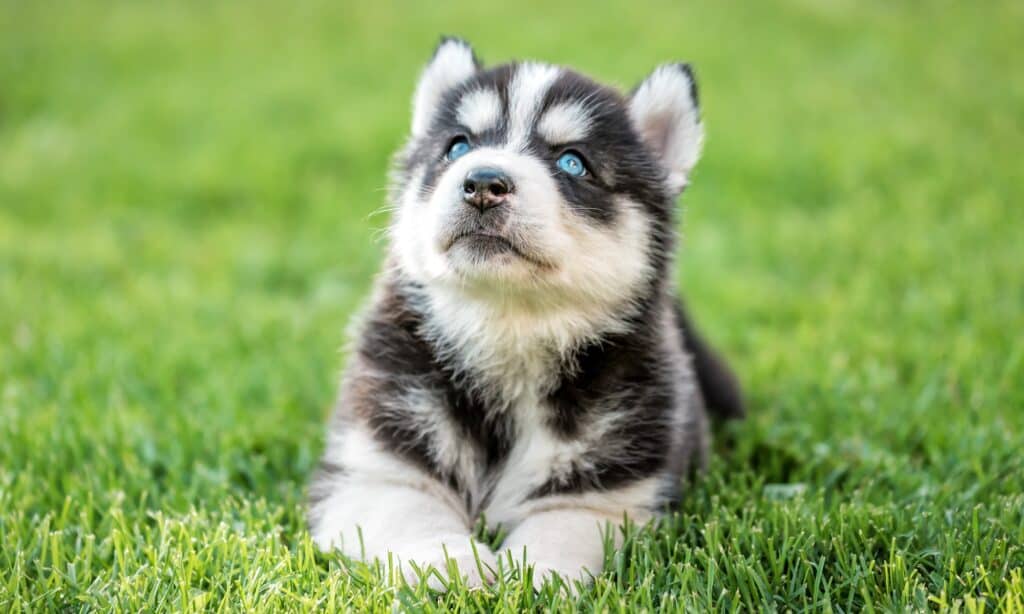
There is no gimmick to guarantee blue eyes in puppies; it is decided by genetics.
©iStock.com/vovashevchuk
What Should Huskies Eat?
Huskies should eat a well-balanced, nutritionally complete dog food that includes the following:
Protein
Dogs, including huskies, get most of their protein from meat. It’s important for strong muscles that repair quickly, a glossy thick coat, and healthy skin. Good sources of protein for huskies include fish, chicken, beef, and turkey. Muscle meat and organ meats are both good choices. The liver, heart, and kidneys provide plenty of protein for huskies but use moderate amounts of liver to avoid high levels of vitamin A. Non-meat protein sources include soybeans, peas, and lentils.
Fats
Fats maintain a husky’s muscles, nerves, cells, and tissues, and they help absorb minerals and vitamins A, D, and E. Great sources of omega 3 and 6 fats are fish oil (but not tuna or swordfish due to mercury issues), flaxseed, vegetable, and chicken fat oil.
Carbohydrates
Carbs provide energy, and active huskies need plenty of carbs. Good sources are legumes, grain, rice, and cooked sweet potato.
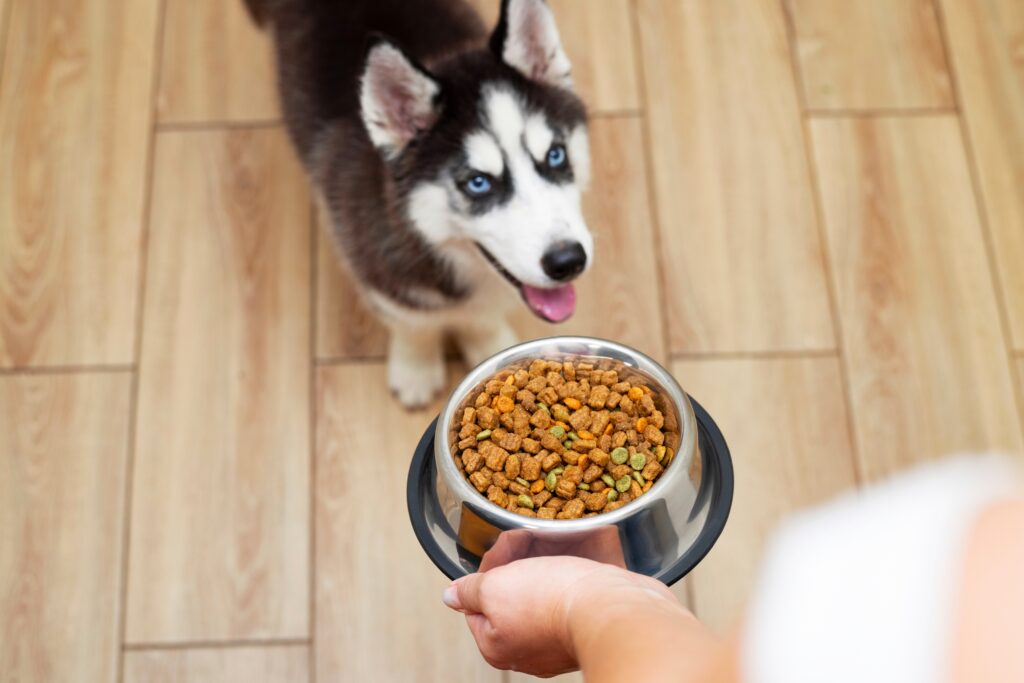
The liver, heart, and kidneys provide plenty of protein for huskies.
©Andrii Spy_k/Shutterstock.com
What Do Huskies Eat: Food Intolerances
On occasion, huskies develop food intolerance and allergies. The symptoms include diarrhea and vomiting, chewing or gnawing at their skin, declining coat condition, excessive flatulence, frequent ear infections, coughing, and sneezing. Speak to your veterinarian if you suspect your husky has a food intolerance so they can help uncover what is safe for your husky to eat.
Can Huskies Eat Vegetables?
Yes, huskies can eat vegetables (other than the toxic ones listed below). They are great sources of fiber and vitamins, so eating some veggies daily can improve a dog’s digestive system by keeping their stools regular and fighting radicals that can lead to cancer.
Vitamin-packed vegetables safe for huskies to eat include carrots, sugar snap peas, bell peppers, green beans, blueberries, and apple slices.
Good Husky Training Snacks
When we’re thinking about what huskies eat, it’s important to consider snacks. All dogs love snacks!
Snacks are great training aids and provide an affectionate way for dog and owner to bond. Most huskies respond well to offered snacks.
However, the ASPCA recommends dog snack foods make up no more than 10% of their daily diet, so don’t go overboard. The majority of their food should be nutritionally balanced dog food.
The veggies listed above can be used as tasty, low-fat training snacks for huskies. Don’t give your husky lots of fatty snacks on a regular basis because those calories build up, and unless they are very active, it can lead to obesity.
Overfed huskies are at risk of obesity; it’s a common problem because, according to the Association for Pet Obesity Prevention, 56% of pet dogs are overweight or obese in the States.
Overweight huskies are at more risk of diseases like diabetes, cancer, high blood pressure, and joint issues that really reduce their quality of life. Another serious problem brought on by obesity and fatty food is pancreatitis. Pancreatitis is a very painful, re-occurring condition that requires vet treatment each time. It’s distressing for a husky and expensive to treat, so it’s best avoided by giving your husky low-fat dog treats to eat on occasion.
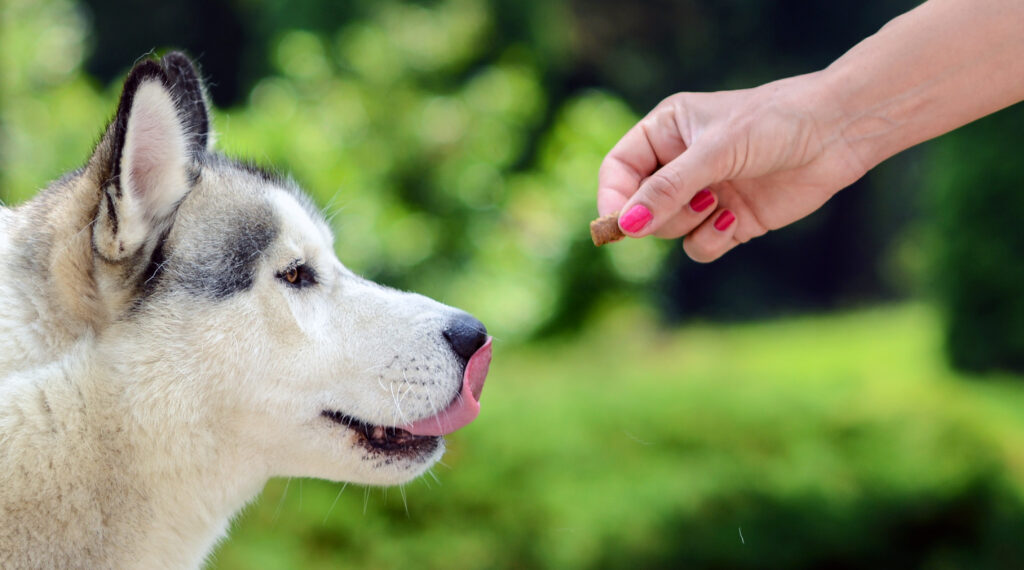
The ASPCA recommends dog snack foods make up no more than 10% of their daily diet.
©Lex0077/Shutterstock.com
Do Huskies Need to Eat Every Day?
A husky’s nutritional needs change as they age, become more or less active or develop illnesses, but they need to eat every day, even if they don’t finish all their food.
A hungry dog is a miserable dog, and hunger leads to bad behavior, such as counter-surfing or snapping.
What Can’t Huskies Eat?
Huskies eat various meat, grains, fruits, and vegetables because they’re omnivores, not carnivores like their wolf relatives. Domestic dog diets have evolved alongside our own, so they are more able to digest various foods.
However, huskies should not eat certain foods because they are toxic. They include:
Grapes
Grapes, raisins, sultanas, wine, and fruit juices contain toxic grape compounds that huskies can’t digest. It causes vomiting and diarrhea and, in large amounts, has been fatal.
Xylitol
Xylitol is a sugar replacement used in cakes, chewing gum, junk foods, and juice. It causes a big blood sugar drop that creates tremors and gastric upsets. On occasion, xylitol poisoning has been fatal.
Chocolate
Chocs contain caffeine and theobromine, which are stimulants that dogs can’t metabolize, making them very sick. Chocolate is also fatty and may trigger pancreatitis, plus it may contain dangerous xylitol.
Avocado
Avocados contain pectin in the rind, stone, and leaves, which can make dogs unwell in large amounts.
Onions, Leeks, and Garlic
Members of the allium family are dangerous for all dog breeds. Alliums contain thiosulfate that sticks to red blood cells and causes oxidative damage and hemolytic anemia. It builds up over time; the symptoms are pale gums, panting, dark urine, and lethargy.
Macadamia Nuts and Black Walnuts
These nuts are dog-toxic and often found in cakes and biscuits. Black walnut trees are another potential avenue. They contain indigestible compounds that may cause organ failure.
Blue Cheese
The mold roquefortine C can make huskies sick with gastric upsets, tremors, and lethargy. Beware blue cheese because dogs love it!
Alcohol
Any form of alcohol is harmful to huskies because it contains ethanol. Spirits, beer, wine, fruity cocktails, alcohol-infused sweets, and raw bread dough all contain enough ethanol to make a dog very unwell.
Why Does My Husky Eat Its Own Poop?
One of the more unappetizing habits, coprophagia, is the habit of eating stools.
Dogs sometimes do this to obtain nutrition, or it’s a learned behavior that gets attention. If it’s suddenly started, speak to a veterinarian because eating their own poop can be a sign of illness.
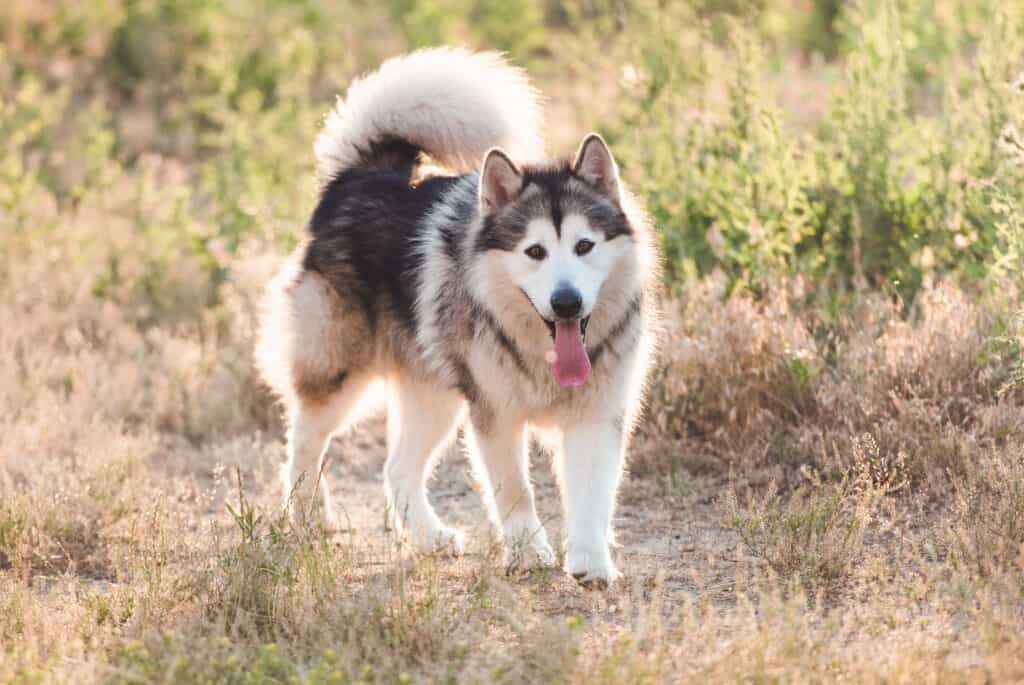
Alaskan Malamutes might look like huskies, but they are much bigger and more powerful.
©iStock.com/VYCHEGZHANINA
What Do Huskies Eat: Recap
A husky’s diet depends on its age, health, and activity levels, but huskies should be fed nutritionally complete dog food every day, whether that’s a store-bought wet or dry food or a homecooked version. Keep treat to 10% or under and avoid fatty, processed foods plus anything on the toxic list.
Huskies are generally easy to feed. They enjoy a wide variety of meats, grains, fruits, and veggies and have the natural energy levels to burn off excesses.
The photo featured at the top of this post is © Andrii Spy_k/Shutterstock.com
Ready to discover the top 10 cutest dog breeds in the entire world?
How about the fastest dogs, the largest dogs and those that are -- quite frankly -- just the kindest dogs on the planet? Each day, AZ Animals sends out lists just like this to our thousands of email subscribers. And the best part? It's FREE. Join today by entering your email below.
Thank you for reading! Have some feedback for us? Contact the AZ Animals editorial team.






